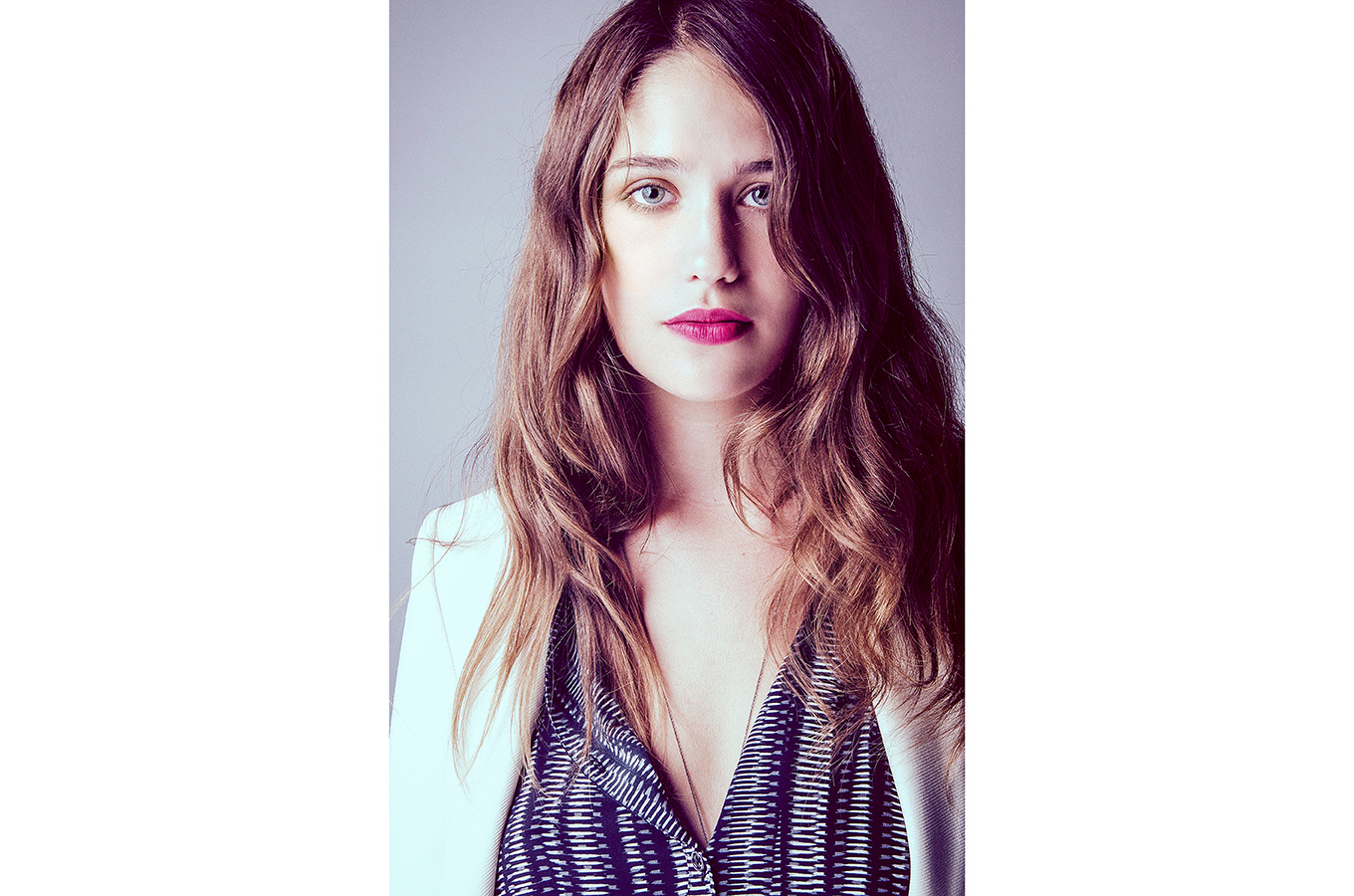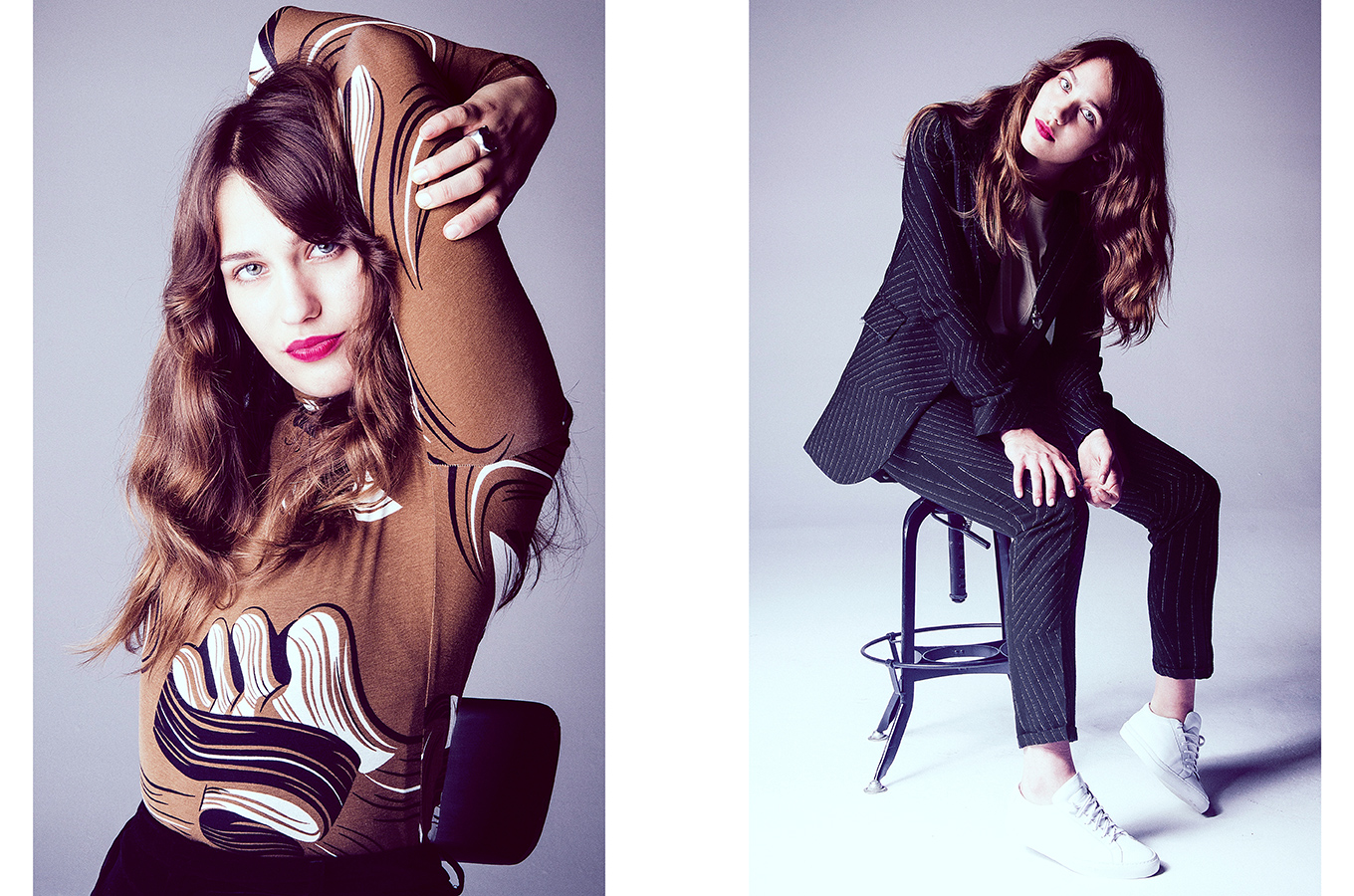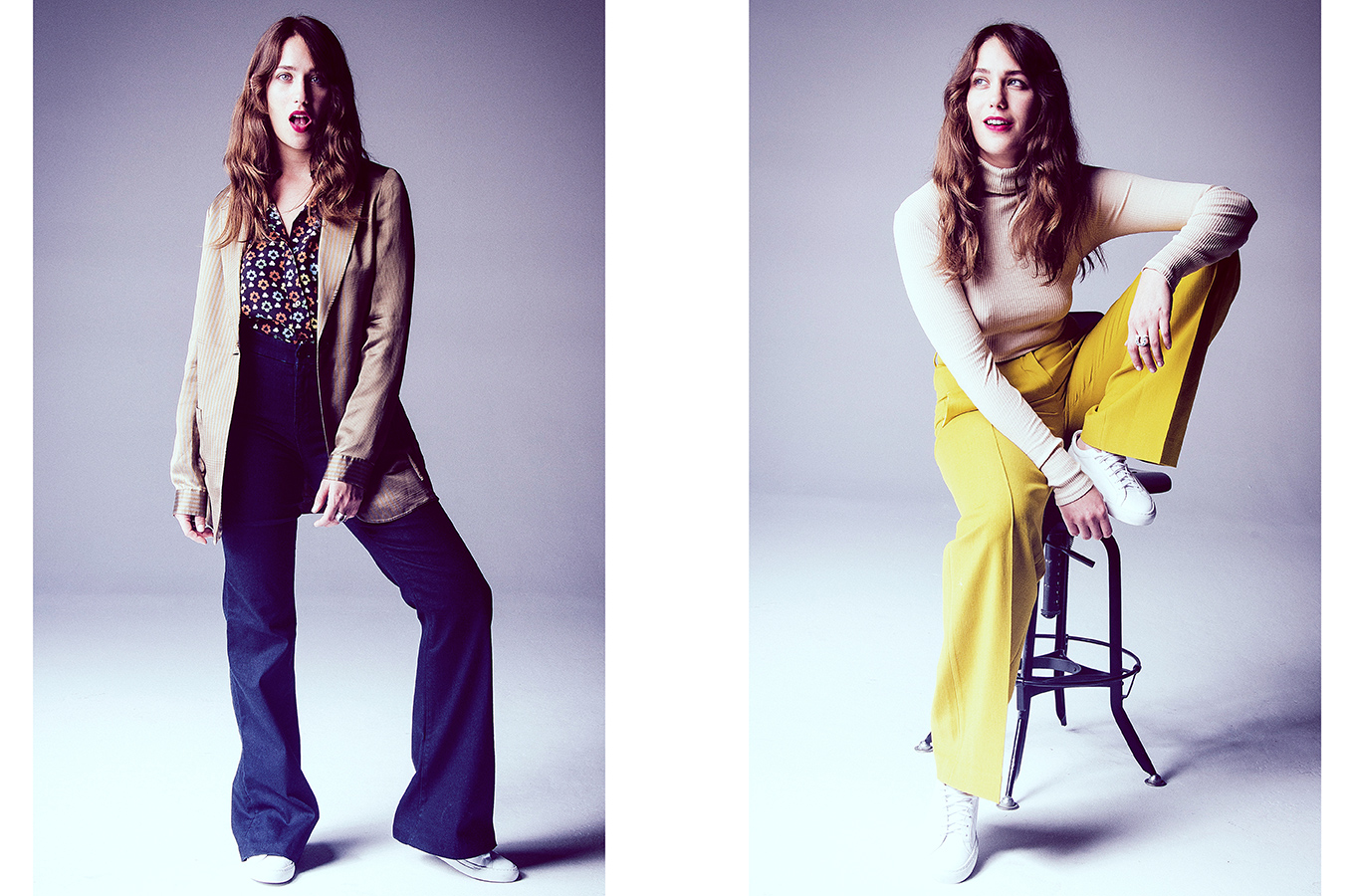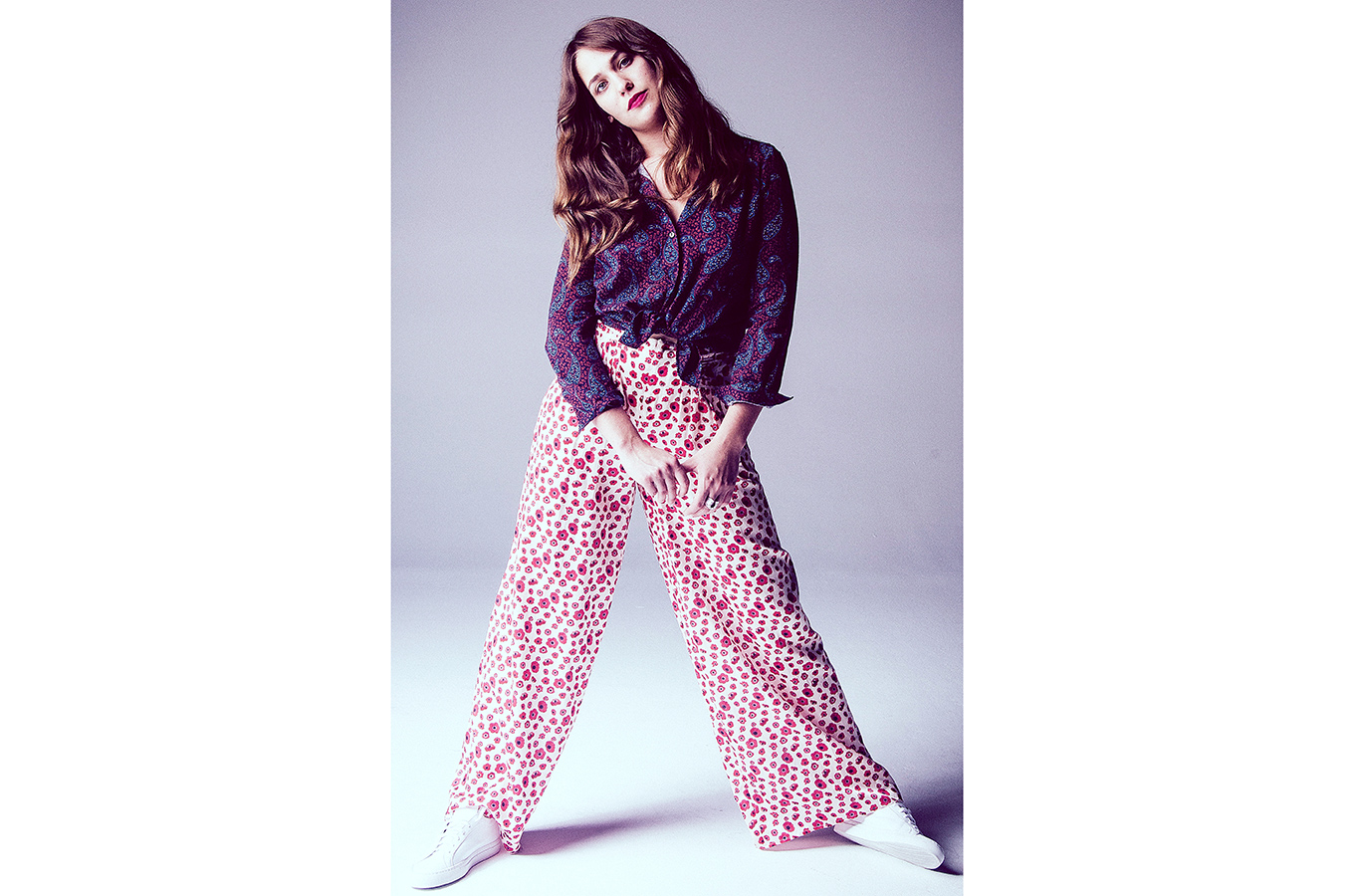Lola Kirke
Images by Jan-Willem Dikkers
Styling by Christian Stroble
Makeup by Regina Harris
Hair by Blake Erik
Studio: Sandbox Studio
Interview by Charlotte Lieberman
“If I were unartistic and grew up with the same parents—
a drummer and a designer—I would be fucked.
Luckily, I love telling stories and expressing myself,
so acting really does feel right.”
— Lola Kirke
LOLA KIRKE
Lola Kirke is a British-American actor who has starred in Noah Baumbach’s Mistress America (2015), David Fincher’s Gone Girl (2014) and is currently the lead in the Amazon series Mozart in the Jungle. She is the daughter of Simon Kirke, drummer for the English rock band Bad Company, and sister to Jemima Kirke of the HBO show Girls. Kirke will also appear in Scott Hicks’ Fallen and Doug Liman’s Mena.
CHARLOTTE LIEBERMAN
Charlotte Lieberman is a Brooklyn-based writer whose work concerns self-acceptance, feminism, meditation, mental health, relationships and sex. She contributes regularly to Cosmopolitan and the Harvard Business Review, among other online and print publications. Lieberman’s poetry has been published in the Boston Review, the Colorado Review, Nat. Brut and The Feminist Utopia Project.
When I met Lola Kirke, we were seven years old. For one year we rode the school bus together every morning from Greenwich Village up to our prep school on the Upper East Side. Neither of us seemed to fit in: we were the artsy, creative and “weird” downtown kids. After that year, Lola and I fell out of touch.
I was fortunate to re-encounter Lola just over a year ago, after getting my own start as a freelance writer and becoming aware of her burgeoning acting career. Despite Lola’s unsurprising success as an actor thus far, she hasn’t changed much from that seven-year-old girl I met years ago. She is at once jovial and sharply intellectual, ethereal and grounded, ironic and earnest, goofy and glamorous. To me, these apparent paradoxes add up to one thing: authenticity.

Charlotte Lieberman: You’ve said in other interviews that you were always serious about acting as a kid. It seems like child stardom could have been available to you—was there no chance of that?
Lola Kirke: I wonder if being a child star would’ve actually been available to me. I certainly tried! I went on so many auditions and never got any parts. Obviously getting jobs as an actor is really fucking hard. But I didn’t end up going down the route many aspiring child actors take, which involves being in commercials, catalogs or whatever comes their way. Honestly, I’m relieved that being a child actor didn’t happen because I got to have a childhood that was really my own.
CL: That has me wondering about how you eventually did get your start, which happened relatively recently. I imagine you, like all of us, kicked into career-anxiety mode after graduating from college—though certainly that looks a little different when it comes to trying to be an actor. Was there a conscious moment when you finally felt ready to pursue professional acting?
LK: I can’t remember one day waking up and saying, “OK, I’m going to actually do this.” Perhaps I was so confident or so delusional as a child, but it always just seemed like being an actor would eventually work. People told me I was charismatic as a kid, that I was “such a character.”
At the beginning of college, I decided not to study theater. That felt like a big deal because you know, if you want to be an actor, of course you study acting. I did filmmaking instead because I really wanted to work with my hands and do something really cerebral.
“I want to play sexy roles.
I am sexy. I feel sexy, and I don’t think
that to be sexy means one thing.”
— Lola Kirke
Getting started recently was actually the continuation of a longer process. When I was growing up, I had planted some seeds back in New York because my mom had friends who worked in the industry. As a kid I’d often talk to them at dinner parties and tell them, “I want to act!” They would give me advice and offer to talk to me, so I ended up having these connections that were really amazing at following through.
I had also signed up to work with a manager when I was 17, and she would try to send me auditions throughout college. At some point I just started blowing her off because I wanted to do my thing. I wanted to make movies of my own and be in plays of my own and read. Then one day she sent me an email that said, “If you don’t reply to me in a week, I’m not going to work with you anymore,” and that scared the shit out of me. We’ve been working together ever since, and she’s wonderful.
CL: You come from a privileged family of artistic people. Did that dynamic create certain expectations about what you’d be doing career-wise as an adult?
LK: The specific bourgeois culture I grew up in is problematic in some ways. My parents and all of their artistic friends basically told me that being an artist was how you exist in the world. The idea of being a doctor or lawyer always struck me as boring when, in reality, both professions are probably fucking fascinating.
I think if I were unartistic and grew up with the same parents—a drummer and a designer—I would be fucked. Luckily, I love telling stories and expressing myself, so acting really does feel right.
GONE GIRL
Gone Girl is David Fincher’s 2014 drama following a once-happy couple’s suspicions, lies and treachery. Adapted for the screen by Gillian Flynn and based on her best-selling novel Gone Girl, the film stars Ben Affleck and Rosamund Pike and was nominated for Academy and Golden Globe awards.
FREE THE NIPPLE
Written and directed by Lina Esco, Free The Nipple (2014) is based on the true story of New York City women working to free the female body from US censorship laws by holding topless protests.
MISTRESS AMERICA
Directed and co-written by Noah Baumbach, Mistress America is a 2015 comedic farce starring co-writer and collaborator Greta Gerwig alongside Lola Kirke. Gerwig plays Brooke, an adventurous New Yorker who becomes best friend and muse to her soon-to-be stepsister Tracy (Kirke), a lonely college freshman captivated by her spontaneous lifestyle.
MOZART IN THE JUNGLE
Mozart in the Jungle is a 2014 Amazon Original series starring Gael García Bernal and Lola Kirke, inspired by oboist Blair Tindall’s memoir Mozart in the Jungle: Sex, Drugs, and Classical Music. The show is set behind the curtains of the New York Philharmonic, revealing the romance, grit and competition in the secluded world of professional classical music.
CL: So far we’ve seen you as Greta in Gone Girl—the minor but memorable con artist; Liv in Free the Nipple—the confident ringleader of a group of activists; Tracy in Mistress America—the naive yet ambitious Barnard college student; and Hailey in Mozart in the Jungle—a sexy but geeky oboist. Did these roles all feel vastly different? Or do you see a common thread?
LK: In the casting world I think I lean toward dorky. I would like to play more roles like the one I did in Gone Girl. In Mozart in the Jungle and Mistress America, I play a kind of similar character who appears to be submissive but ultimately isn’t. What connects all of my characters so far is the fact that they’re all more than what you see.
In Gone Girl, you meet this character and think she’s one thing, but then find out she’s going to fucking betray someone and get whatever she wants. In Mistress America, the dynamic is similar: you meet Tracy, this unassuming, sweet girl and then find out she’s going to write whatever she wants to about the people around her.
I haven’t yet gotten to play in-your-face sexy people, and I count myself lucky for not being pigeon-holed as a typically “sexy” woman in the films I’ve been in so far. But I also think dismissing sexiness is limiting. I want to play sexy roles. I am sexy. I feel sexy, and I don’t think that to be sexy means one thing.
CL: You’ve also worked on films that span a vast array of genres, as well as different budgets and set sizes. How have your experiences on these distinct sets differed?
LK: Hopefully throughout the career that I hope I have, I’ll get to walk between different sets. The only big movies I’ve made so far have been Doug Liman’s movie Mena, which is coming out next year, and David Fincher’s Gone Girl. Both of those directors were deeply interested in good performances. Doug Liman was really into us playing around with lines and giving suggestions, while David Fincher was much more regimented, though he still created a challenging and supportive environment for actors.
I will say that I don’t think small sets are necessarily more conducive to good performances. A film with a small budget might not have the money to shoot a necessary scene, so they tell the actors to just do more exposition, which often isn’t the best choice. Though that was definitely not the case for Mistress America, which didn’t have a big budget. We were all changing in minivans and eating rogue Kind bars while shooting.
“It made me see that the complex admiration I
often feel towards other women is necessary
to my development instead of just like, a creepy
thing about me that I should be ashamed of.”
— Lola Kirke
CL: Since you brought up Mistress America, I want to address the question of whether you identify with the character of Tracy. You’ve spoken in other interviews before about circumstantial similarities with that character, but can you address other, subtle threads of emotional resonance with Tracy?
LK: I am so relieved that Greta and Noah wrote a character like Tracy. It made me see that the all-consuming and complex admiration I often feel toward other women is necessary to the development of my own individuality instead of just like, a creepy thing about me that I should be ashamed of. I really connected with that aspect of Tracy.
Infatuation in particular doesn’t feel like an emotional experience one can readily manufacture, and yet the intensity of Tracy and Brooke’s friendship in Mistress America felt so authentic and idiosyncratic. How do you go about trying to “play” infatuation? In Mistress America, my particular relationship with Greta’s character reminded me a lot of my relationship with my sisters. Sometimes I would try superimposing my relationship with Jemima onto Brooke and Tracy’s dynamic or just pretend that I was talking to my sisters while I was on set. Then it got to the point where I didn’t have to do that anymore because I knew Greta well enough, and I loved her.
And if you’re asking, “How do you dredge up emotions that you’re not actually feeling with another person?” Well, that’s just being an actor.
CL: Do you feel like acting is more challenging when you strongly identify with a particular character?
LK: I hope that I can always relate to the characters I play. When I’m digesting a new character, I spend a lot of time and energy trying to figure out who they are. I ask myself tons of questions: who do I know who is like them? What are their circumstances? How can I be that person who does things very differently from me? Where did I learn to dress like that? Where did I learn to talk like that?
CL: As an actor, do you feel you have enough time and energy to balance your acting work with just living your life, along with any other pursuits, artistic or otherwise?
LK: On some level everyone spends their life asking, “Who am I and what do I want to be in this world?” I know I really do love acting and telling stories, but I also just want to be a person.
Right now I’m starting a free arts camp in Haiti for next summer, which is really exciting. I think education is activism, and that teaching art is really important. Doing work like this outside of movie work is really important to me.
CL: Related to activism, let’s talk feminism. You’re a feminist, but you don’t necessarily feel like you need to map that identity onto your work as an actor. Does that adequately summarize your position? How do you negotiate your personal values with the work you’re doing?
LK: Feminism is inherent in what I do. This industry is historically undiverse, to put it mildly. If you’re not a white man and, on top of that, you’re interested in challenging the status quo, which I am, your presence is intrinsically political. It’s not as though I’m an actor and my side project is being a feminist. So I try to choose work that doesn’t compromise those values.
“I’m suspicious of the litmus test
I’m using to judge myself: is it my own,
or is it cultural? I don’t want
to love my job more than my body.”
— Lola Kirke
CL: Speaking of being a woman in the patriarchy, there is a ton of pressure on women to look a certain way. What has your experience been with issues around eating and body image now that you’re a professional actor?
LK: I was so relieved to make it out of my teens without an eating disorder that I think I became just really pro-eating whatever I want. But it’s a double-edged sword. Sometimes, after months of eating whatever I want, I’ll see myself in something and not like the way I look. I don’t like that because I’m suspicious of the litmus test I’m using to judge myself: is it my own or is it cultural? I don’t want to love my job more than my body. And I don’t want to guide other women down the all-too-trodden path of hating their bodies. Fortunately, I do think that values are beginning to change. But it’s tough. There’s still a lot going against body positivity.
CL: So, what’s next?
LK: I have a supporting role in Mena, the Doug Liman movie starring Tom Cruise. Then season two of Mozart in the Jungle is out December 30th. And then a movie called Fallen, based on the book series by Lauren Kate. I play the magic girl’s non-magic best friend. It’s done, but I don’t know when it’s coming out yet.
CL: You’re 25. That’s not old. How do you deal with the project of trying to just grow up amidst all this accelerated career growth?
LK: Part of me feels like I have been 30 since I was seven, which probably makes me seem more like a seven-year-old. When you act like you know everything, it just makes you seem like you know nothing.
The people I work with who are older than me must think I’m naive and sweet when I sound like I know what I’m talking about. But the thing is, I really do have a sense of what I want—what roles I want to play, what roles I don’t want to play, the projects I want to seek out. I think I have direction, but maybe that will change.
Now, I’m just trying to take care of myself and stay on top of things. You know, remember to eat breakfast and pay my taxes.


RIGHT - Costume National Dark Gray Pinstripe Wool Blazer & Pant, Levi’s Made & Crafted Pocket T-Shirt, Common Projects Low Top Sneakers, worn throughout, Necklace Stylist’s Own


RIGHT - Adam Lippes Wide-Leg Pants, LACAUSA Long-Sleeve Rib Turtleneck






